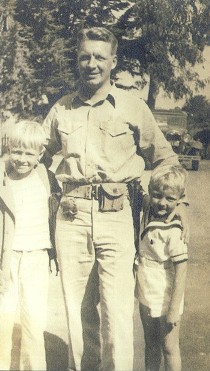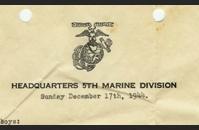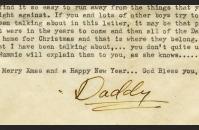LESSON PLAN:
"My Dear Little Boys…"
Interpreting a Letter Home from the War
Letters written by soldiers in World War II to family, loved ones, and friends were a lifeline between the writer and those on the Home Front. By carefully reading these letters, students can learn about the experiences of war, and the emotions, fears, and desires of soldiers away from home, enriching their understanding of historical sources, war, and human relations.
Objective:
Students will analyze an individual soldier’s feelings about World War II and in turn learn how to use letters as a primary source for research. Students will gain a greater appreciation for the WWII soldiers’ experiences.
Grade Level: 7-12
Standards:
History Thinking Standard 2— the student comprehends a variety of historical sources and can reconstruct the literal meaning of a historical passage and identify its central message.
Content Era 8 (1929-1945), Standard 3B—the student understands World War II and how the Allies prevailed.
Time Requirement: One class period, and possible homework assignment.
Download a printable pdf version of this lesson plan
Directions:
1. Explain that through this lesson students will approach the war from the view point of an individual soldier. Ask the class why this is important.
2. Pass out copies of the Iwo Jima Fact Sheet and information about Leonard Isacks. Ask a student to read the fact sheet aloud to the class and locate Iwo Jima on a map or globe. Next, have a student read the information sheet about Leonard Isacks to the class.
3. Pass out copies of Leonard Isacks’ letter for students to read. Have students complete the Student Worksheet about the letter. Hold a class discussion about Isacks’ letter, using the questions as a guide.
4. Hold a class discussion about the use of letters as a primary source of historical information. This lesson can also be used when teaching about citizenship, expressive or persuasive writing, or analogies.
5. Assign students the task of writing a letter to a friend or loved one. In their letter they should express the things they feel are most important in life, how best to overcome obstacles, or give some other important advice. When writing their letters, students should imagine that they may never see the recipient again.
6. Students may volunteer to read their letters to the class.
7. Ask students if their feelings about WWII or war in general have changed after this lesson. How and why?
Assessment:
Components for assessment include the worksheet, class discussion, and the student-written letter.
Enrichment:
The Digital Collections of The National WWII Museum have numerous examples of individuals writing home to their families. From battle-tested soldiers to Red Cross workers, nearly every oral history has some mention of letters written home. Explore these oral histories by searching “letters home,” clicking the tag “mail” or using advanced search term, “Personal/Family Relationships.”
A Brief Biography of Lieutenant Leonard Smith Isacks, Jr.

Marine First Lieutenant Leonard Smith Isacks, Jr., with his two sons in New Orleans, LA.
Gift of Fletcher Isacks, 2001.038
The cost of war is not measurable in numbers. It is a price that can only be calculated in human terms—in the individual lives it destroys and in the pain it inflicts on those who are left behind.
Marine First Lieutenant Leonard Smith Isacks, Jr., of New Orleans left behind a wife and three young children when he embarked for the Pacific. On December 17, 1944, while stationed at 5th Marine Headquarters near Hilo, Hawaii, Isacks typed out a letter to his two sons. It was not a letter about battle or bloodshed; it did not even describe his everyday activities, physical surroundings, or wartime experiences. Rather, in his letter he tried to explain to his children why he could not be with them for Christmas that year. His plain language and simple analogies simplified the war down to a child’s level of understanding. He wrote about fairness, responsibility, courage, and freedom. It is a tender and loving letter from a man who knew he might never make it home. Whether he would or not, Leonard Isacks wanted to be a good father to his children, a father who sets a good example, teaches right from wrong, and challenges his children to live up to the ideals they believe in.
On the morning of February 20, 1945, one day after United States Marines invaded the Japanese-held island of Iwo Jima, First Lieutenant Isacks was crouching in a foxhole about 300 yards from the beach when he was wounded by Japanese mortar fire. Unconscious, with severe wounds to his head and left arm, he was evacuated to a hospital ship offshore. He died the following day.
Leonard Isacks was buried at sea. He was 34 years old.
His letter was donated by his family to The National WWII Museum and is on display in the Museum’s D-Days of the Pacific exhibit along with other personal items.
The Letter
Letter Transcription
HEADQUARTERS 5TH MARINE DIVISION
December 17TH, 1944
My dear little boys:
I am writing you today, just a week before Christmas eve, in the hope that you will get this little note at Christmas time. All of this coming week will be holidays and I can just imagine the fun you will be having, especially when you know it is just a few days before Santa Claus will be coming. If it were possible, I would like to come down the chimney myself, and crawl right into your stocking, wouldn’t that be a surprise? I would enjoy it even more than you, but since your dad is far away and Santa Claus has only the reindeers that will fly through the air, I’m afraid we’ll have to let Santa Claus use them. After all, he has so many places to go in such a short time.
I won’t be able to give you a Christmas present personally this year, but I do want you to know that I think of you all the time and feel very proud of the way you have been helping your mother while I am gone. I know that it is only natural for young, healthy and strong boys like you are to want to play and have fun all of the time; but I do want you to think about helping Mummie, because it is so hard for her to do everything while I am gone. I know that you would like to give me an X-mas present too, so I will tell you what you can do, and this will be your X-mas present to me. Everyday ask Mummie if there are any errands you can go on for her, and when there are errands to run, say “sure Mummie” and give her a big smile; then during the day, go up to your room and look around, if there are toys scattered all around, or you left some of your clothes on the floor, pick them up; also, when Mummie is busy trying to clean up the house, don’t leave her by herself, but ask Mummie if you can help take care of baby sister. If you will do these things for me that will be the finest X-mas present that you could give me. Oh yes, and CC, are you eating your meals like a real man now?
Well my boys, I guess you often wonder why people fight and have wars, and why lots of daddies have to be away at Christmas time fighting when it would be so much nicer to be at home. That’s a hard question to answer. But you see, some countries like Japan and Germany have people living in them, just like some people you and I know. These people want to tell everybody what they can do and what they can’t do. No one likes to be told how to live their life. I know that you certainly wouldn’t like it if one of the boys in the neighborhood tried to tell you what church you should go to, what school you should go to and particularly if that boy would always be trying to “beat up” some smaller or weaker boy. You wouldn’t like it, would you? And unfortunately, the only way to make a person like that stop those sort of things, or a country like Japan and Germany, is to fight them and beat them...and teach them that being a bully (because after all that’s what they are) is not the way to live and that we can’t put up with it. What does all of this mean to you? Just simply this, my boys, Dad doesn’t want you to ever be a bully, I want you to always fight against anyone who tries to be one; I want you to always help the smaller fellow, or the little boy who may not be as strong as you; I want you to always share what you have with the other fellow; and above all, my boys, have courage, have courage to do the things that you think are right. To do these things, you need a strong body and a brave heart; never run away from someone you may be afraid of: if you do, you will feel ashamed of yourself and before long you will find it is easy to run away from the things that you should stand up and fight against. If you and lots of other boys try to do the things that Dad has been talking about in this letter, it may be that people will not have to fight wars in the years to come and then all of the Daddies in the world will be home for Christmas and that is where they belong. Perhaps, some of the things that I have been talking about...you don’t quite understand, if you don’t, Mummie will explain them to you, as she knows....
A Merry Christmas and a Happy New Year...God Bless You,
Daddy
Questions to Discuss
Directions: After reading Lieutenant Isacks’ letter, discuss the following questions. The answers to some of the questions will be found in the text of the letter. Cite phrases or words from the letter in your answers, when possible. Other questions have no right or wrong answers, but should be based on your own experiences and feelings.
1. In what Marine division did Lieutenant Isacks serve?
2. Who is Isacks writing to?
3. Where does Isacks wish he could be on Christmas?
4. What does Isacks ask his sons to give him for Christmas?
5. What are the three main reasons Isacks writes this letter (what is the main subject of each paragraph)?
6. What analogy does Isacks use to help explain the reasons for this war?
7. Is this a good analogy? Why or why not? Can you think of another one?
8. What else would you want to know about Lieutenant Isacks and his family? How could you find this information?
9. Based on this letter, describe the kind of person Leonard Isacks was.
10. Are your feelings or understanding about WWII any different after reading Isacks’ letter? If so, how?
11. Should historians use people’s private letters to better understand the past? Why or why not?
12. In what ways has technology made an impact on letter-writing? Will historians of future wars have access to the thoughts of soldiers through their letters?
Download a printable pdf version of this lesson plan
TAKE ACTION:


EDUCATION PROJECTS:
Student Travel – WWII Educational Tours
High school and college students, learn the leadership principles that helped win WWII on a trip to France or during a weeklong residential program in New Orleans. College credit is available, and space is limited.
See You Next Year! HS Yearbooks from WWII
Collected from across the United States, the words and pictures of these yearbooks present a new opportunity to experience the many challenges, setbacks and triumphs of the war through the eyes of America’s youth.
The Victory Gardens of WWII
Visit the Classroom Victory Garden Project website to learn about food production during WWII, find lesson plans and activities for elementary students, get tips for starting your own garden and try out simple Victory Garden recipes!
The Science and Technology of WWII
Visit our new interactive website to learn about wartime technical and scientific advances that forever changed our world. Incorporates STEM principles to use in the classroom.
Kids Corner: Fun and Games!
Make your own propaganda posters, test your memory, solve puzzles and more! Learn about World War II and have fun at the same time.





